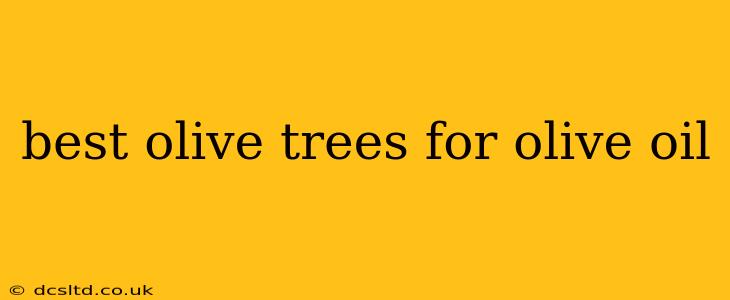Choosing the right olive tree variety for olive oil production is crucial for maximizing yield and achieving the desired oil quality. Many factors influence the final product, from climate and soil conditions to the tree's genetic makeup. This guide explores some of the best olive tree cultivars known for their exceptional oil, addressing common questions along the way.
What are the most productive olive tree varieties?
Productivity varies significantly depending on environmental factors. However, some varieties consistently demonstrate high yields. These include:
- Arbequina: Known for its high oil content and early maturity, Arbequina is a popular choice for commercial growers. Its oil is generally mild and fruity, making it versatile for cooking and consumption. It's particularly well-suited to warmer climates.
- Arbosana: Another high-yielding variety, Arbosana produces a robust, slightly peppery oil with a medium intensity. It’s known for its adaptability to different soil types.
- Koroneiki: This Greek variety is incredibly productive and produces a high-quality, intensely fruity oil with a distinct peppery finish. While less cold-hardy than some others, it thrives in warm, Mediterranean climates.
- Picual: A highly productive Spanish variety renowned for its high polyphenol content, resulting in an intensely fruity oil with a bitter and peppery taste. Picual oil is very stable and has a long shelf life.
It's important to note that "productivity" isn't solely about the number of olives; oil yield per olive also plays a significant role. Some varieties might produce more olives but yield less oil compared to others with fewer, oil-rich olives.
What are the best olive tree varieties for cold climates?
While olive trees are generally associated with warm climates, some varieties exhibit greater cold hardiness:
- Leccino: A relatively cold-hardy Italian variety, Leccino produces a medium-intensity oil with fruity notes. It’s often used in blends to balance out more intense oils.
- Frantoio: Another Italian variety, Frantoio boasts good cold hardiness and produces a fruity, slightly peppery oil with excellent aroma.
- Mission: This historical California variety is known for its adaptability and reasonable cold tolerance. Its oil is typically medium-intensity with fruity and slightly bitter notes.
The precise cold tolerance depends on the specific microclimate and the tree's age and overall health. Even cold-hardy varieties can suffer damage during exceptionally harsh winters.
Which olive tree variety produces the best olive oil?
There's no single "best" variety, as the ideal choice depends on personal preferences and intended use. Each variety produces oil with a unique flavor profile:
- For a mild, fruity oil: Arbequina is a great starting point.
- For a robust, peppery oil: Koroneiki or Picual are excellent choices.
- For a balanced, versatile oil: Leccino or Frantoio often work well.
Ultimately, the "best" oil is subjective and depends on individual taste. Exploring different oils from different varieties is the best way to discover personal preferences.
What factors affect olive oil quality?
Many factors beyond the tree variety influence the final quality of the olive oil:
- Climate and soil: Sunlight, rainfall, and soil nutrients significantly impact olive production and oil quality.
- Harvest time: Picking olives at optimal ripeness is crucial for achieving the best flavor and aroma.
- Oil extraction methods: Modern extraction methods minimize damage to the olives, resulting in higher-quality oil.
- Storage conditions: Proper storage prevents oxidation and preserves the oil's freshness.
By understanding these factors and selecting a variety suitable to your region and climate, you can increase your chances of producing exceptional olive oil.
What are some less common but high-quality olive oil varieties?
While the varieties above are widely known, several others are gaining popularity for their unique oil qualities:
- Pendolino: This Italian variety is known for its high yield and its ability to produce a high-quality oil with delicate fruity notes.
- Maurino: A Tuscan variety, Maurino produces an oil known for its delicate, balanced flavor profile.
Exploring these less common varieties can open up a whole new world of olive oil flavors and experiences. Remember to research the specific needs and characteristics of any variety before planting.
This guide provides a comprehensive overview of the best olive trees for olive oil production. Remember that proper care and attention are essential for maximizing yield and achieving high-quality results, regardless of the variety you choose.
